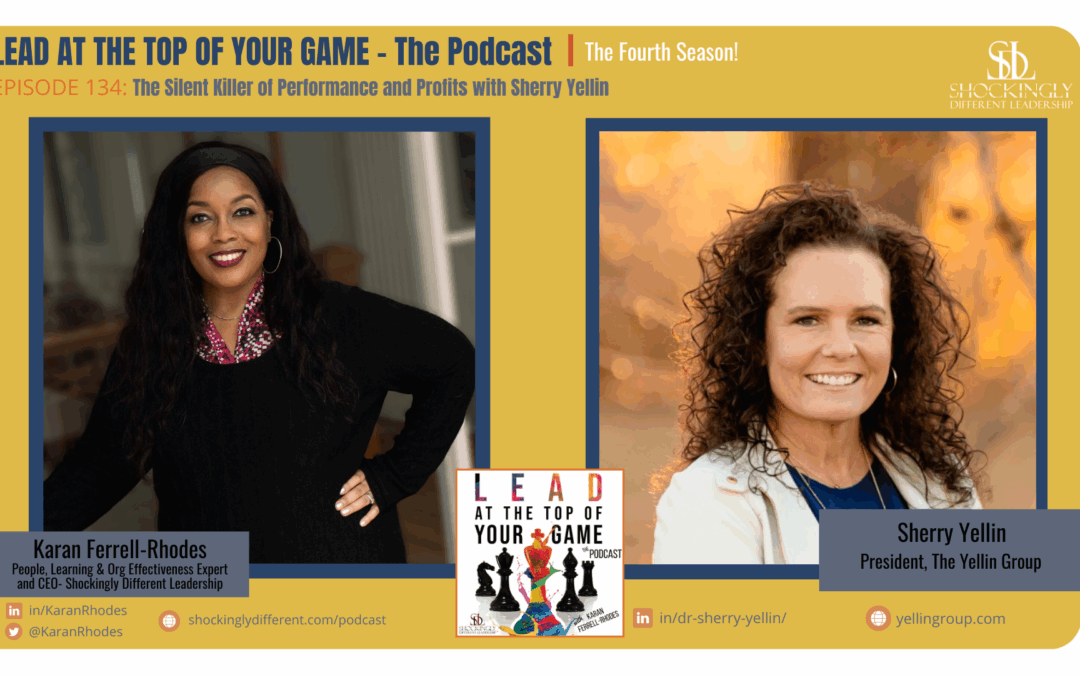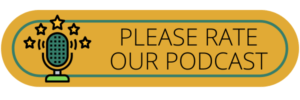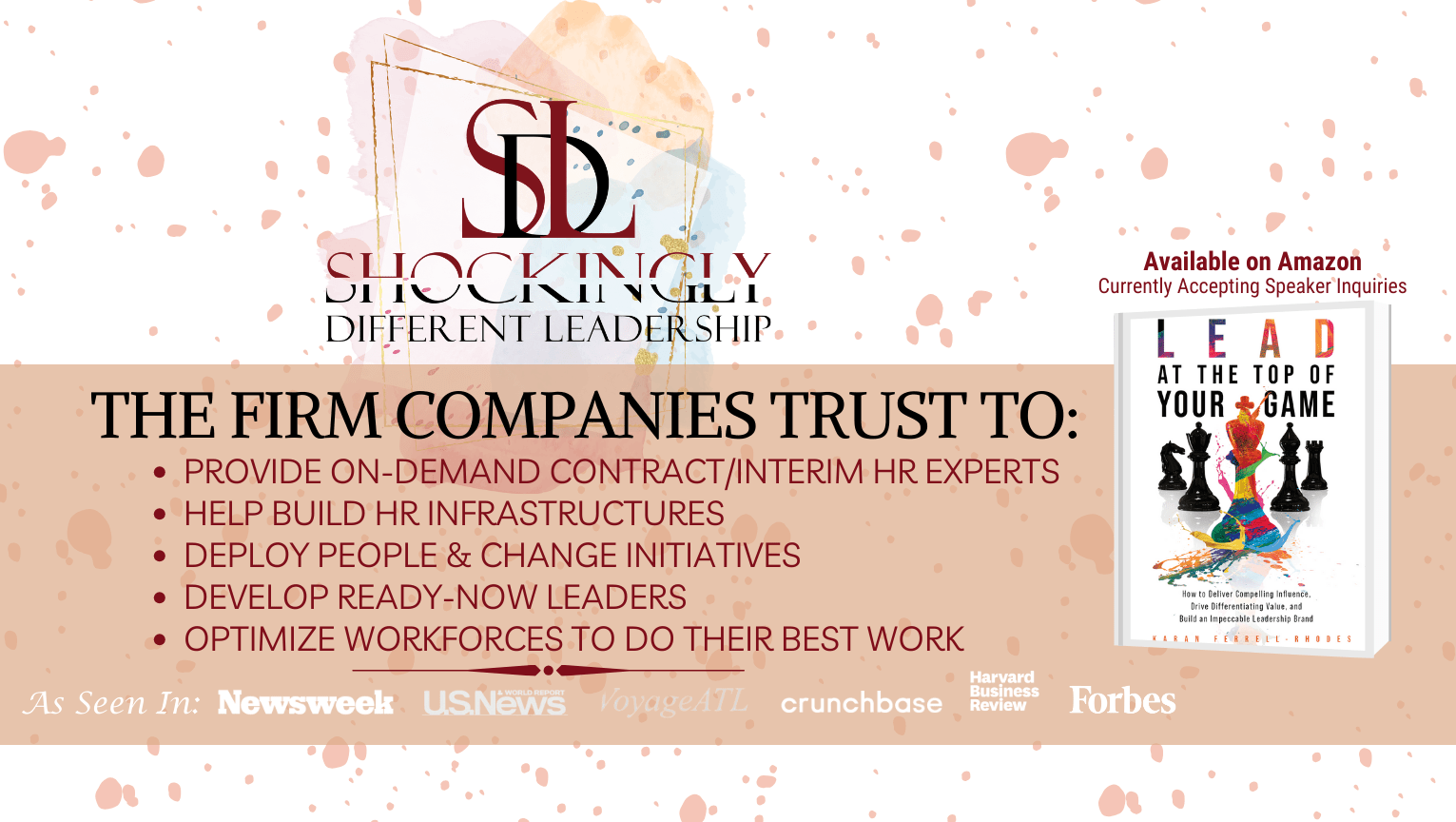IN THIS EPISODE, KARAN FERRELL-RHODES INTERVIEWS SHERRY YELLIN
Sherry Yellin is the author of several books on leadership and is driven by a passion for understanding how the brain learns and how this knowledge can transform leadership and organizational culture. She shares her journey from academia to entrepreneurship, recounting pivotal moments that shaped her career, including her early work in workplace education and her realization of the profound impact that neuroscience can have on learning and leadership. Sherry emphasizes the importance of aligning leadership strategies with brain science, particularly in managing harmful threats in the workplace, fostering clarity, and empowering individuals through choice and voice.
Dr. Sherry Yellin is the president of The Yellin Group, which specializes in helping leaders and organizations leverage brain-based strategies to enhance performance and culture, providing practical, research-backed tools and teachings on leadership development. Their unique Cranium Campus platform offers micro-training on leadership topics, providing leaders with the opportunity to engage in short, impactful teachings and collaborative discussions designed to help them lead more effectively by understanding and applying the science of how the brain functions optimally.
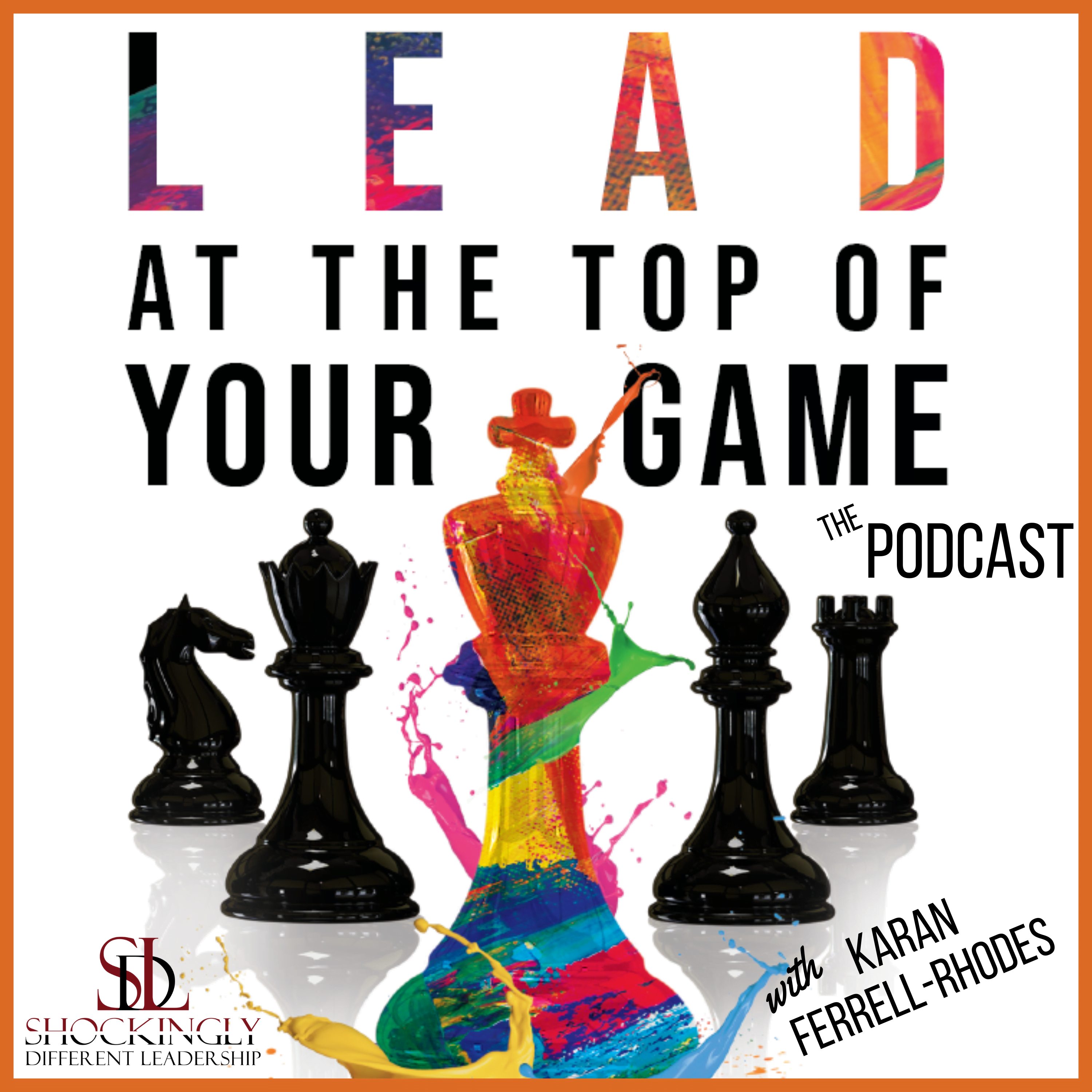
Posted by
SDL Media Team
Rather view our video podcast?

WHAT TO LISTEN FOR:
- Sherry’s story about transitioning from college English teaching to workplace education and founding The Yellin Group.
- What is the significance of understanding how the brain learns in the context of leadership and organizational culture?
- “Negative threat” and how it impacts brain performance and workplace behavior.
- How leaders can proactively minimize “negative threat” and foster clarity, choice, and positive outcomes for their teams.
- Practical strategies for leading through change and uncertainty, including the importance of giving people a voice.
- What is the “Cranium Campus” and how does it support leadership development?
“Negative threats impact your brain and performance.”
FEATURED TIMESTAMPS:
[02:20] Sherry’s personal background and life outside of work.
[04:27] Sherry’s career shift from teaching to workplace education and the founding of The Yellin Group.
[10:01] Discussion on the impact of neuroscience and technology on leadership and learning.
[12:51] Overview of the “Cranium Campus” and the seven brain-based leadership strategies.
[14:00] Explanation of “negative threat” and its effects on brain performance and workplace culture.
[15:19] Signature Segment: Sherry’s entry into the LATTOYG Playbook: How “negative threat” shuts down the brain’s executive functions essential for effective leadership and collaboration.
[23:26] Practical advice for leaders: fostering clarity, giving choice and voice, and explaining the “why” behind decisions.
[28:27] Signature Segment: Sherry’s LATTOYG Tactic of Choice: Leading with Courageous Agility
[31:23] Information about The Yellin Group’s monthly “Leading Lab” sessions and how to participate.

ABOUT SHERRY YELLIN
Sherry Yellin specializes in equipping leaders to be extraordinary through innovative learning and coaching solutions. With a Ph.D. in cognitive learning, Sherry uses evidence-based learnings from neuroscience as the foundation for her work in coaching and leadership development.
With more than 22 years of experience, Sherry is recognized professionally as an expert in leadership, learning solutions, and executive development. She is the author of Unforgettable Leadership: 7 Principles for Leading, Learning, and Living and is the founder and facilitator of The LEADing Lab Mastermind Group, an international group of multidisciplinary leaders from various industries that meets monthly to discuss challenges and share best practices. She is also the creator of The CRANIUM Campus, an online learning platform that hosts micro-trainings on focused leadership topics.
Sherry is married with two children and lives outside of Dallas, Texas, with her husband, Lance, who is also a leadership coach, and her miniature donkey, Jasper. In her free time, Sherry travels to watch her daughter play collegiate softball for the Rogers State University Hillcats and spends time “giving back” as a volunteer at North Texas Food Bank and Los Cabos Missions for Christ.
LINKS FOR SHERRY:
- Website: www.yellingroup.com
- LinkedIn: https://www.linkedin.com/in/dr-sherry-yellin/
- Sherry’s Book: “The Science of High-Performance Leadership: 7 Brain-Based Strategies to Become a Leader Worth Following” https://yellingroup.com/book-launch/
EXTERNAL RESOURCES:
- Learning Lab Tuesday Morning Session Registration: https://us02web.zoom.us/meeting/register/NNkj7bxwTYaHuxTRyBqzCA#/registration
ADDITIONAL RESOURCES FOR YOU:


Episode Sponsor
SDL is the go-to firm companies trust when needing to:
- supplement their in-house HR teams with contract or interim HR experts
- implement leadership development programs that demonstrate an immediate ROI and impact on the business

Episode 134 | The Silent Killer of Performance and Profits with Sherry Yellin
Sherry Yellin 00:00
You know your business results are coming from culture, and your leaders are your number one impact and influencer of culture. So if we want a great culture, we’ve got to be investing in our leaders. And the great news about all of this is that it doesn’t have to be guesswork. There really is a science behind it, and the science is, what we’ve discovered about this is how your brain works best.
Voiceover 00:03
Welcome to the “Lead at the Top of Your Game” podcast, where we equip you to more effectively lead your seat at any employer, business, or industry in which you choose to play. Each week, we help you sharpen your leadership acumen by cracking open the playbooks of dynamic leaders who are doing big things in their professional endeavors. And now, your host, leadership tactics, and organizational development expert, Karan Ferrell-Rhodes.
Karan Rhodes 00:36
Hello, my superstars. This is Karan, and welcome to another episode of our lead at the top of your game podcast. On today’s show, we have Dr Sherry Yellin. And Sherry is the president of the Yellin group, and she’s also the author of a couple of fantastic books. One is called the science of high performance leadership, seven brain based strategies to become a leader worth following, and a second book called unforgettable leadership, seven principles for leading, learning and living. So with those types of books, she knows she’s going to have some fantastic insights to share with us on this episode. But she’s also the creator of the cranium campus. It’s an online learning platform that hosts micro trainings that focus on a variety of leadership topics. I can’t wait to dig in and learn more about herself and the work she’s doing and the client she’s serving. So welcome to the podcast, Sherry,
Sherry Yellin 01:38
Well, it’s nice to be here. I’ve listened to several episodes, and love the guests that you have and the format and so practical in your takeaway. So it’s a real honor to be here.
Karan Rhodes 01:49
Oh, thank you. That means a lot coming from a fellow leadership expert like you. So thank you so much for those kind words. Well, you know, I have a ton I want to talk to you about and unfortunately, these podcasts are so short and I’m so verbose, I have to pull myself back at times. We’re gonna try to get as much as we can in, but before we get started, we always love to learn just a tad more about our guests. So for just as much as you feel comfortable, can you give us a sneak peek into your life outside of work?
Sherry Yellin 02:20
That’s a great question, because as you know, as an entrepreneur, there’s no end sometimes to work in real life. But I live outside of Dallas, Texas, so if you’re picking up a hint of an accent, that’s where it’s coming from, and more than a hint, probably. But fortunately, we’re still outside of the metroplex, and what that means is there’s still no buildings in my sunset, so we’re away from that, but the the people are coming quickly, so those days I know are numbered, but my husband and I work together. So we live together, we work together, and that’s always a unique, you know, relationship when you can do that. And so that’s, we love to travel. And I wish we got to do more of it, and we’re making an intentional effort over this next year to do that. But yeah, so that’s, that’s our day to day is to I get to work out and and have a beautiful view with no buildings in my in my area, and definitely at sunset, it’s really beautiful.
Karan Rhodes 03:33
Well, you know, in Atlanta, which I have an accent that comes out, especially when my family comes around, I try to do get rid of it a little bit on the podcast, but if you want to get me my my southern drawl and the y’all and all that, it’s going to come in anytime. So I totally understand that, and we’re going to keep our fingers crossed to keep your view as pretty as it can be for as long as it can well. Thank you so much for sharing, and we wish you and your husband much continued success down in Texas. So now let’s turn actually to you. I’d love to feature you a bit. Would you mind sharing with our listeners, just maybe a few highlights of milestones in your professional career, and what led you all to founding the yelling group?
Sherry Yellin 04:26
Yeah, so I wanted to be a college English teacher until I became a college English teacher. So some of the listeners may be able to relate to those moments where you wanted to get somewhere your whole life, and then when you get there, it’s like a Madagascar penguin moment of you realize this is not where you want to be, and that’s how the whole process started. So I was teaching, and I was not happy grading five paragraph essays for eternity, and a friend of mine. Mine called me and she said, we’re starting a workplace education program at and she said lots of other things, but I just knew she was offering me a way out, and I took it. So I started working at a workplace education program at atnt, and the time in history super important here, because AT and T at this time is big spools of copper cable. They’re soldering circuit boards, not what we know today, and what they were wanting to do, they were trying to level up the skill set of their employees. Self Directed work teams are now being rolled out a lot more responsibilities, and many of those manufacturing workers had low literacy skills, and so I took this job and didn’t know that my life would change forever. There was one manufacturing employee who came into my office one day and she sat in front of me and told me, out on the floor, I’m known as a bad girl. And then she did what I least expected, which she started to cry, and she said, I can’t read. And there were so many more demands, work wise, and personally, she was caring for an elderly dad, and needed to be able to read all the documentation, and I sat across from her, and I think it all hit me at a whole other level, just really the divine relationship when you get to help somebody learn something new. Because I really had no idea how to help her, and I told her that, but we decided we would try it out. And she and I started working together. And it didn’t take maybe just a few weeks before there were other people coming and joining in with us. And it actually grew into several groups of people. And what really changed the direction of everything I would do from that point forward is I really just wanted to take her and unscrew the lid and look and ask how, what’s going on in there? How does the brain learn? And I just had that one simple question. I thought there might be a simple answer to that question. 30 something years later, we’re still trying to figure that out, but once I started that direction and really started studying how the brain learns, I just started asking, What if parents knew this? What if educators knew this? What if leaders knew this, because we could get a lot easier results. If we can lead, learn and live the way the brain works best, you can get better results, usually with a lot less effort. And what I was seeing was we’re not aligned with how the brain works best in education, definitely in leadership, how we’re running companies, how we’re running teams. In fact, there’s a lot of brain antagonistic we’re actually working against how the brain works best. And the problem with that is you’re creating a host of unnecessary costs, and you got to own that. And the problem is, most of the time, we are creating the very thing we’re complaining about. And so, you know, seriously, I had no idea that that point in time, between 1990 and 2000 would later be called the decade of the brain because we had new technology emerging that allowed us to see the brain working while its owner was still alive and and learning so much so fast, and then, of course, having more communication methods to get that information out to people faster, in more practical ways. And so in 2001 I started a business where I could just work with leaders and teams to share this information with them, and then how it translates into the practical day to day.
Karan Rhodes 09:20
I love that, because you’re you’re spot on. I mean, I’m way older than you, and I remember it was like an interesting convergence back in the 90s and 2000s where neuroscience took off. Technology evolved at a nanosecond. It’s still evolving at a nanosecond, but it was like a convergence of neuroscience technology and then a hunger for people in organizations to upskill and empower their teams and performance. And that was like a perfect storm for what you know, what you actually wrote about in both your books.
Sherry Yellin 10:00
Yeah, I love the word serendipity, and it definitely was, even though I don’t teach college English, I’m still a recovering English teacher, and I love words. And it really was, it was, really was a moment of serendipity, not only when she came forward and had the vulnerability and the trust to ask for help, yeah, which, in and of itself, is a life lesson of the value of asking for what you need and realizing that that could actually cause this ripple effect of change for years to come. And so I am so grateful for that moment, but then also to be at that time in history of all of the information that was accessible to us that previously we had known. And you’re right, it was hitting so many fields, everything from education, leadership, economics, architecture. I mean, everybody was, you know, sometimes taking it a little too quickly, yeah, and into application. Yeah, like, you know, your baby’s not going to be smarter because you listen to Mozart, if you remember that study. So sometimes we took things a little too quickly into application. But it is a really fascinating field. When you think about how much, how many millions of dollars companies invest in new equipment and new technology, when in fact, this piece of technology that’s between our ears is the greatest piece of technology and the greatest equipment that’s coming in and out of work every single day, and ironically, our companies will stop investing in their people when their people are the very technology and equipment that’s running The other technology and equipment that they’re investing in.
Karan Rhodes 12:04
Yeah, definitely. Well, um, I know you’ve, you know, written the two books, and you know I’m not, I know we can’t go through all both of them, but what I would like for you to do is share either some of the strategies or maybe highlight your cranium campus platform, because I know that stands for an acronym that stands for things. So what would you love both leaders to understand about what you’re offering, and we also have a lot of talent development leaders as well that listen to the podcast, and I would love for them to just get just a bite sized snack or a teaser of what your program offers.
Sherry Yellin 12:49
So the book, this the the next book that’s coming out. It was the first one that you mentioned, the science of high performance that actually comes out October 1, if we stay with our timeline that we’re on. And it really is working through these seven strategies and realizing that few things just reinforcing you know your business results are coming from culture, and your leaders are your number one impact and influencer of culture. So if we want a great culture, we’ve got to be investing in our leaders. And the great news about all of this is that it doesn’t have to be guesswork. There really is a science behind it, and the science is, what we’ve discovered about this is how your brain works best, and if we align with that again, we get those better results with less effort. And so I’ll walk through these seven strategies. They do spell out the word cranium and but there is a foundational strategy, which is the challenge strategy, and this is where we really dig into how negative threat impacts your brain and performance. And that is a common theme through all seven of the strategies. We introduce it in the first one. But if I had one message for leaders, or anybody who see, they don’t necessarily, you know, need the title, but it’s someone who has that leadership mindset, not only leading themselves, their families, their teams, their organizations, it would be to better understand how negative threat impacts brain performance if we get nothing else that is the most important thing, because not all threat is bad. Some threat is what we would consider. Are motivating threat. So accountability is an example of that. Accountability is a great motivating threat. In other words, if I don’t fall in line with this, or if I don’t live out the company values, I’ll be held accountable to that. Accountability is a great thing. When accountability is not there. You get more negative threat. You know another motivating threat is even what we’re doing right here. If you know you’re going to present to a group or you’re going to talk about something, you’re going to be motivated to prepare for it. I’m not talking about that kind of threat. It’s really important that we differentiate motivating threat from what I call negative threat, which is limiting threat, and limiting threat, or negative threat typically has three characteristics. One is that there’s a level of uncertainty, and that’s one reason why I love your courageous agility. So it is about learning to live in the unknown. So one of the characteristics of negative threat is that there’s an element of uncertainty or confusion. The second characteristic is that there’s a sense of loss of agency, or I don’t feel like I have a lot of choice and voice or control. And then the third characteristic is, typically, I’m anticipating some kind of negative outcome. So when those three things come together. What happens in your brain is the part of your brain, I’m sure everyone’s read about, in some way by now, is that prefrontal cortex, which really is the seat of all those functions we want as productive human beings, being able to plan and think ahead. Having empathy, it drives that part of our ability to have empathy and to see from other people’s perspectives. So it’s also the seed of collaboration, in that sense, because if we can’t see from different perspectives, how would we ever collaborate? And it also drives creativity and innovation. And when we have lots of activity in this part of our brain, we have a lot of curiosity. We’re open minded. We’re more fluid. People want to sit beside us in classes, you know? They want to go on vacation with people like that, right? And what we have to recognize is that negative threat for all practical purposes shuts all those functions down. Yeah. And so when you think about as a leader, for yourself, for your team, for your organization. If all those executive functions is what we want to see every day, it does not serve us to create an environment where there is negative threat, or maybe we’re not even creating it, not to mitigate or to manage an environment where those three characteristics come together.
Karan Rhodes 18:28
And I’m curious, can you give us them and like you can make it up, but like a real world example, so we understand the whole negative threats, but how does one’s behavior, like a leader’s behavior. What could that look like? An example.
Sherry Yellin 18:47
Yes, so I’ll start one that everybody could relate to, and that’s covid. Okay? Covid was the talk about the perfect storm, yeah, where there was a lot of uncertainty and confusion. We didn’t feel like we had a lot of choice and voice, and we were all seeing awful things going on around us for an extended period of time. Yes, so when you think about the progression of human behavior over that year, for sure, we saw things that in my lifetime I never thought I would see. You know, it started with fighting over toilet paper, and then we, you know, just kind of move moving pictures. Through that season, we saw racial tensions come to a whole new height by the end of that year, if you remember, we saw people storming the Capitol. So that is a big example, but how that can play out at work is, let’s say change, right? People don’t resist change. They. This confusion and uncertainty, they resist not having some kind of voice in it. Yes, and they resist when they don’t understand the bigger reason behind the change. So those
Karan Rhodes 20:15
That then there’s adoption of the change. Because of the…
Sherry Yellin 20:17
Yeah, yes. And so you know, when you think about we aren’t we really aren’t thinking individuals who happen to have emotions. We’re emotional individuals who happen to think, yeah, so if you’re leading change, and you just come in with, you know, 100 PowerPoint slides, well, you haven’t really connected with those three things about how are you managing the uncertainty? Where could we give people a voice, a say in how this plays out, and how can we help them see how it really is going to benefit? If you ignore those three things, all you’ve done is trigger the brain into threat, and your brain on threat looks very different than your brain on challenge, which is the challenge strategy, because when my brain goes into threat, there’s some really important you can actually see it if you’re looking for it. People become very defensive. They get overly committed to being right. They look for an enemy. So, you know, you we hear this a lot, management against staff, or carpet versus concrete, or, you know, North Texas versus South Texas. It doesn’t matter, like us against them, that’s a brain under threat, and you can sometimes hear it too, because when your brain is under threat, your peripheral vision literally narrows, which was a good thing, so that we would focus on the thing that was attacking us. But the same thing happens internally. Your internal ability narrows, so your brain goes into a tunnel and it it just can’t see as many options. So what you’ll often hear, which I think is pretty interesting to listen for, is when you start listening for either or either I stay or I go, either I speak up or I either or is usually an external indication that that person’s brain is under threat. So we want to start listening for Where is there uncertainty or confusion? Where do they feel like they haven’t had a say in this? Where are they not seeing the positive outcome of this?
Karan Rhodes 22:53
So that’s the active listening part of it, but as a leader, is, are there things that they can do to be proactive in minimizing it, like having your regular one on ones with your staff and asking the question, you know, are there any things that are frustrating you are there ways that I can help lay the groundwork for better results, or Are there things that leaders can do so it doesn’t get to the point of the this or that?
Sherry Yellin 23:25
Yeah? Yeah, absolutely. So let’s just take each one, because change is a common trigger for negative. Yeah, but there are other common triggers too, when I don’t feel like I belong, when I don’t feel like I’m included, or if I feel like there’s favoritism, or if I don’t feel like what I’m doing every day has a lot of purpose and meaning. But I would say three things, let’s take each one for example. So if confusion is the problem, clarity is the solution. So sometimes just asking people, where do you need greater clarity. So if I’m introducing a change, I want to be sure that I’ve gone in recognizing the emotional connection to this, not just the logical probably going to show the bigger picture of the change. I’m going to take the time to talk about how it’s going to impact each individual, yeah. And then I want to ask questions like, Where do you need clarity, right? Where have I not been clear? Clear and clarity are actually power words that will trigger a chemical difference in your brain. It’s it’s really pretty cool. The second thing is, Where can I allow people a choice in voice, and the earlier, the better. Sooner is smaller. Later is larger. So if I’m mindful of who are all the stakeholders, this change is going to impact, how can I involve them in. Earlier in the process, in a meaningful way, not in a tokenistic, like way, but in a meaningful way. Like I really am going to take your input and it is going to shape because your your brain doesn’t buy into what it’s told to do. It buys into what it helped build. Yeah, so the earlier I can involve people in that process. And then the third thing about anticipating a negative outcome, I would say the best thing leaders could do is add this phrase on to everything that they say. And here’s why.
Karan Rhodes 25:38
yeah, that’s a powerful phrase.
Sherry Yellin 25:40
Yes, so you know, we’re changing this process, and here’s why, or I’m asking you for this report, and here’s why, I’ve challenged the leaders we work with to almost make it ridiculous, how they add that on, like I’m going to lunch, and here’s why, because I want it to become so automatic that just rolls off their tongue. So, you know, that’s just a super easy way and listening and observing, really paying attention to what are those indicators that the brain is under threat? Because your brain under threat is the last thing that we want to create, but it’s also the last thing we want to ignore, because what will happen is you will start to see the indications of that, and it’s very hard to turn it around once it you know once you’re there, because it all goes back to culture. You’re going to have a culture by design or by default, and you can design it and manage those things like negative threat, or you wake up one day and you realize we’ve got a lot of struggle that we’ve probably created. It’s going to take a while to turn that around.
Karan Rhodes 26:58
It will, yeah, definitely, wow, we did not even dip our toe in the water with all the other questions I have for you, and I know we’re running close short on time, but what I will encourage listeners, you all to do is to make sure that you, you know, check out our show notes and where you can find Sherry and her information her work, because we have not even done it justice of how impactful it is. But before we let her off our episode today, you know we have to ask our signature question, and my long term listeners know that we have done research on high performing leaders and companies, and out of the research were seven big buckets, we call them, of tactics that all high performing leaders and companies ended up doing at some time or another. All of them are equally as important. You just use them at different times based on your situation. And Sherry was so kind to share that courageous agility really popped for her. And courageous agility is all about having the courage and the fortitude to, you know, take baby steps forward and take calculated risk, even if you’re uncertain of what the future will bring or what will come out of those baby steps. So I’m curious minds. Would love to know, Sherry, why did courageous agility really resonate with you?
Sherry Yellin 28:27
It so resonates with me. Because I think that is the number one limiting, I guess, condition when there is uncertainty, to the point where I’ve coined a phrase. Well, my husband and I use it a lot with each other. We call it phobo, F, O, B, U, and it’s the fear of being uncertain. The fear of being uncertain holds people back from so much potential, and it is the key characteristic of negative threat. Yeah, but if we can recognize that just because something is uncertain or other you words uncomfortable or unpopular doesn’t mean it’s wrong. It just means it’s uncertain, uncomfortable and unpopular. And when you study visionary leaders, people who have been able to go into truly the unknown and the uncertain and probably were very unpopular and uncomfortable along the way, but the people that have the courage, you know, and the agility and the resilience and the fortitude to do that. They’ve changed the world.
Karan Rhodes 29:50
They have you’re so right.
Sherry Yellin 29:51
So in a sense, the uncertainty is really the gateway into a whole new level of possibilities.
Karan Rhodes 30:00
Well, I suffer from it as well at times. I mean, we all do give that mind shift and, you know, give my talk, repeat affirmations and and try to keep myself positive. But everybody has those moments when you’re subject to it. But the key thing, I think, is to remember that you can, you know, shift your mind and work yourself out of that, and to stay focused and to just take those baby steps, don’t get overwhelmed. And you’ll find, as you said, more times or not, you’ll be able to pivot and and go through the forest of what your uncertainty was. And if you’re able to do that, boy, the grass is usually greener on the other side. Do you agree?
Sherry Yellin 30:43
I definitely do. I do think that growth is always on the other side of comfort.
Karan Rhodes 30:54
Yeah, absolutely. Well, Sherry, thank you so much for for answering our signature question. As I mentioned before, we’ll have a ton of information in the show notes, including your bio links to where our folks and listeners can find you, but we always love to give a little bit of air time to our guests as well. So would you mind sharing where our leaders can find more information about your books, your workshops, your Cranium framework and all the great work that you’re doing.
Sherry Yellin 31:23
Thank you for asking. So my website is Yellen, group, Y, E, L, L, I N, group.com, and we actually do a session every month. It’s the third Tuesday of the month, and we do a short teaching. We have lots of leaders from lots of different industries. No camera required. We give people a break from that. It’s free. It’s 45 meaningful minutes to come together on a topic. I do a short teaching. Give some resources different formats, sometimes, and then for those who want to hang around, you know, we can have meaningful conversation in more of a mastermind setting, but we call it the leading lab, because we think it, you know, if we make life a just a series of many experiments, it sure takes a lot of the pressure off. So I would just invite anybody who wants to join us on those third Tuesday mornings, from 8:00 to 8:45 Central. It’s bright and early, another reason why just grab your coffee, but your camera is not required. We’d love to see you there.
Karan Rhodes 32:34
That’s amazing. And what a great gift any you you will be able to learn from others perspectives as well. Yeah, so that is amazing. Well, thank you so much sharing for the gift of your time and coming on the episode today, it was absolutely tremendous.
Sherry Yellin 32:51
Thank you appreciate the opportunity.
Karan Rhodes 32:55
Absolutely. And thank you to listeners for the gift of your time as well, because, as I always say, there are literally other millions of other podcasts you can be listening to, and we do not take your patronage lightly at all. All that we ask is that you like and subscribe on your favorite podcast platform of choice and share our podcast with just one friend, because by doing so will help us all lead at the top of our games. Thanks so much, and see you next week. And that’s our show for today. Thank you for listening to the lead at the top of your game podcast, where we help you lead your seat at any employer, business, or industry in which you choose to play. You can check out the show notes, additional episodes, and bonus resources, and also submit guest recommendations on our website at leadyourgamepodcast.com. You can follow me on Twitter, Facebook, Instagram, and LinkedIn by searching for the name Karan Rhodes with Karan being spelled K a r a n. And if you like the show, the greatest gift you can give would be to subscribe and leave a rating on your podcast platform of choice. This podcast has been a production of Shockingly Different Leadership, a global consultancy which helps organizations execute their people, talent development, and organizational effectiveness initiatives on an on-demand, project, or contract basis. Huge thanks to our production and editing team for a job well done. Goodbye for now.

Want to be a Podcast Guest?
Check out our guest qualifications and submit our brief form to be considered.
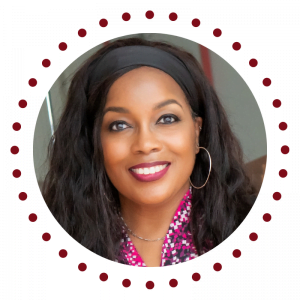
Want Karan to be Your Podcast Guest?
- Blended Workforces & the Gig Economy
- Critical Execution Tactics of High-performing Leaders
- Entrepreneurism & Leading Your Business

Want to be a Podcast Sponsor?
All sponsorships come with a featured spot on show notes pages.
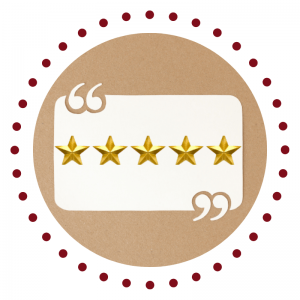
Like the Show? Please Leave a Review
If you like the show, it would mean the world to her if you left a quick review.
Your word is golden, so a HUGE thank you in advance!

#KeepInTouch
via our podcast alerts
Subscribe now to discover why thousands of monthly listeners who are passionate about doing their best work prioritize time each week to listen to the Blended Workforces @Work podcast.
#AboutSDL
#WhereToFindUs
MAILING
4480-H South Cobb Drive
PMB 219
Smyrna, GA 30080
PHYSICAL
2121 NewMarket Parkway
Ste. 108
Marietta, GA 30067
#ContactOptions
Customer Service Email:
service@shockinglydifferent.com
Call or Text:
770-384-1103
#Office Hours
MON-FRI
8:30 AM – 6:30 PM
Weekends By Appointment

